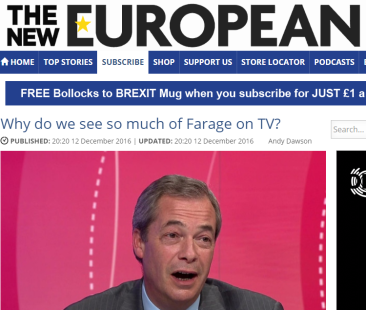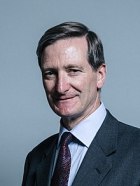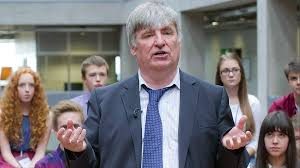
In his piece in the Guardian on 28th March 2019, BBC Director General, Tony Hall, made no reference to Scotland. Given his awareness of the heated debate on BBC bias against independence in Scotland, during and since the referendum, this is interesting.

Driven by accusations of impartiality in reporting of Brexit and, in particular, imbalance in the level of exposure offered to ‘charismatic’ Leave figures such as Farage, Rees-Mogg and Johnson, Hall clearly felt the need to respond. Here’s an extract:
‘The BBC’s director general has admitted that the corporation’s reputation as a provider of impartial news has taken a hit in recent years, while insisting the corporation is committed to giving coverage to all sides of controversial debates…The impartiality of the corporation’s news output has come under attack from all sides in recent years, especially following the Brexit referendum. It has been at the focus of discussions over whether the national broadcaster should be giving airtime to individuals who represent extreme views in the name of balance.’
Does ‘all sides’ include us?
It’s not quite an apology but it is a first step toward the critics, recognising the legitimacy of their opinion. By contrast, in Scotland, we’ve only had indignation and denial.
After a wee dash of sociology and a dog walk for reflection, I see why. Apologies if you were there before me. The Brexit debate is between elites while the IndyRef debate was between elite groups and a predominantly mass movement. There is no need felt by any elite group to apologise to any mass movement they have defeated by deception. In both cases, working-class people were co-opted (fooled?), on the EU Leave side by exploitation of their understandable fear of mass immigration and on the Scottish Independence No side, by their understandable fear of economic uncertainty.
Private Schoolboys on Both Sides of Brexit



Jacob Rees-Mogg, Leave (Eton and Oxford), Dominic Grieve, Remain (Private School and Oxford), Tony Hall BBC DG (Private School and Oxford)
Both sides in the Brexit debate and the BBC are led by predominantly privately-educated, Oxbridge elites who continue to meet at high-level political events, on corporate boards, at sporting events, at receptions and on holiday. They are constantly exposed to peer-pressure in these places and this must be resolved to enable them to survive. For the BBC elite, however, they are under extra pressure, from both sides, and so must try to reduce the level of hostility by some kind of admission of guilt which will enable them to retain their presence in these elite places. They did the same in 2003 under peer-pressure from Labour Party leaders to admit they had not reported the run-up to the Iraq invasion fairly even though, as later research proved, they had been essentially supportive of Blair’s campaign.
No conspiracy is required for this to happen. The members of these elites act without the need for much reflection, always in their own self-interests (survival, advancement) which are also the interests of their elite group as a whole.
Evidence of the social characteristics of these interlocking elite groups was exposed, in 2016, when the BBC’s own Sutton Trust found:
‘Three-quarters (74%) of the UK’s top judges went to a fee-paying school, and nearly eight in 10 (78%) went on to Oxford or Cambridge University. Among top military personnel, some seven in 10 (71%) were educated in the private sector, although just 14% were Oxbridge educated. Slightly more than half of leading print journalists and solicitors (51% each) attended fee-paying schools. Just over half (54%) of these journalists attended Oxford or Cambridge, along with 55% of solicitors and 51% of the senior civil servants included in the study. In politics, half the Cabinet were privately educated (including old Etonian Prime Minister David Cameron) compared with 13% of the shadow cabinet, and around a third (32%) of MPs.’
https://www.bbc.co.uk/news/education-35641061
In Scotland, local Labour ‘chiefs’ form an additional elite group
In Scotland, the elite groups are slightly different but equally influential. As in the UK, there are the same pro-Union groups within the Conservative Party, business, the military, Rugby Union (Union!) and in the Arts. A key difference lies in the role of senior Labour party members, mostly excluded from elite membership in England, but allowed day-to-day management of Scottish institutions as long as they remain loyal to the Union. Dominant in Scotland for 50 years, the Labour Party has had a powerful presence in BBC Scotland.


Head of News in 2014, John Boothman, lost a grievance case against a daughter of the late SNP politician, Margo MacDonald, after she had recorded him being abusive about her and her mother. Boothman’s marriage to a Labour politician, Susan Deacon, also cast doubt on his impartiality.
https://www.theguardian.com/uk-news/2015/jun/16/bbc-scotland-news-executive-john-boothman-moves-jobs
More serious accusations of Boothman ‘acting at the behest of Labour’ had been made in 2013:

Earlier evidence of over-familiarity came with the disclosure of the family friendship and holiday home-sharing between senior BBC presenter, Kirsty Wark and Labour First Minister, Jack McConnell.
More recently, Sarah Smith, daughter of the late Labour leader, John Smith, was anointed BBC Scotland Editor, in 2017, before going on to make a major blunder in the reporting of A&E figures with the effect of seriously misrepresenting the performance of NHS Scotland.
Together, these traditional elite groups, with the Labour party and the media as their functionaries, were able to co-opt working-class groups distinctively loyal to the Union and together mount a fear-based campaign which in the end, triumphed.
The Yes movement, though by no means homogenous or especially working-class in terms of its leadership, was essentially a leftist mass movement with no notable elite membership or funding and relying almost entirely on social media activists for its communications.

I think you are right that Brexit, despite being characterised in the media as a reaction by the ‘plain people of England’ against ‘the faceless bureaucrats of Brussels’, it has always been about two contending elites who could be characterised by the CBI and the City. The former are about industry and commerce the making and provision of goods and services and the City, which is about the commodification of everything – aye! every bloody thing! – and ‘monetising’ it. The crash of 2008 was down to that and, although the financiers caused it Bodger Brown and Lord Darling of Homeflipping, shovelled shedloads of money at them. Undoubtedly, the system needed ‘recapitalisation’ to keep things going, but the banks and other institutions could have been brought under public ownership and things like ‘quantitative easing’ (euphemism for ‘the bung to the financiers’) could have distributed the ‘easing’ much more equitably amongst the rest of us.
Although I voted Remain and still think we are better part of the EU, I am not blind to the fact that the EU is tilted pretty strongly toward the ‘CBI philosophy’, as we have seen with austerity and the treatment of Greece. The EU needs reform, greater, transparency and democratic accountability. However, it does have a pretty strong social and human tights framework and it has a strong framework of rules as to how the market should operate. It is beginning to tackle seriously the shady money laundering transactions which the City deploys via networks, nudges, winks, private schools, London clubs, etc. And it is the imminence of this that has led to the ERG, ReesMogg and other very wealthy people to foment the anti immigrant nastiness to get the referendum result and, they still hope, no deal. No deal is essentially the stripping of rights from the great majority of us.
The BBC is still dog whistling in favour of this. Yesterday, there was a very chummy Nigel/Clive chat between the BBC interviewer and Mr Farage prior to the latter addressing the rally. This morning there was an interview with a ‘Leaver for Britain’ who was a Tory and pretty well heeled. The interview was cordial, with no challenge to her assertions. On Newsnight, yesterday, Kirsty Wark did not seriously challenge Ms Claire Fox and Mr Toby Young.
You are right that in Scotland, that we have the additional ‘establishment’ of Scottish Labour and its influence on BBC Scotland, STV and some of our media. However, it is clear that Labour has lost its hegemony and is leaking members. The media have been gradually giving increasingly overt support to The Ruth Davidson Conservative and Unionis Party, because it now represents the biggest part of the anti-Scotland bloc. Some Labour supporters have switched to it, but more are in a limbo between hatred of the SNP (principally because it is not Labour) and a hope tha Mr Jeremy Corbyn can win in England and begin to institute the kind of redistributive policies which many democratic socialists and social democrats aspire to. The relentless bile being spewed over Mr Corbyn since he became leader and the ‘antisemitism’ issue are all part of the CBI/City fear that Mr Corbyn might,indeed, win and begin to change things. Labour governments have faced this since 1921 and, by various pressures from the Zinoviev Letter, through ‘runs on the pound’ to the financial crash have forced timidity on to Labour. In addition, Labour has also had a fair number of MPs from the ‘establishment’ and these have always been a brake on more extensive redistribution of wealth and power. Look at the number of Mr Blair’s ministers who are pretty wealthy and sitting on the boards of banks, private health companies, property companies, media organisations. They’re alright, Jock!
LikeLiked by 1 person
Thanks, interesting additions.
LikeLike
“overt support to the Ruth Davidson Conservative…party”. I saw the BBC Scotland news at 1.30 on Thursday, after FMQ’s. It was such a disgracefully slanted “interpretation” of what was said that it might as well have been written in Tory Central Office. It was altered by 6.30, presumably because of complaints.
Labour? The BEEB always manage to insert people like Margaret Curran into Gordon Brewers ludicrously shallow and formulaic political shows. As though we would forget what she and her ilk stood for.
Oh, and Tom Harris—has he got his own office at Pacific Quay?
LikeLiked by 3 people
Yes astonishing zombie politics
LikeLike
Your description of the elite society of southern England, exposed now for all to see, is accurate.
That society, with all its antique trappings is reminiscent of the social arrangements last seen in the medieval feudal courts of Europe. Like them, there are layers of different classes each assigned its place in order to strengthen and prolong the established order. We, the common herd (and I use the word advisedly) can only wait and watch in awe as the ‘machine’ goes the way it chooses and makes what it will of the resource on which it depends, our lives.
It is, to my mind, no longer appropriate. Independence would at least provide the opportunity for a more suitable constitutional order to develop in Scotland.
LikeLike
Yes, our elite groups are smaller and a parliament could further trim their privileges..
LikeLike
You’ve covered a fair amount here John, I think it’s just that I don’t care too much about the reasons behind the BBC’s atrocious inability to report news as it is (while declaring they are trustworthy), but I do find it interesting. Democracy, as handed to us by Westminster, is barely better than the feudal system and hasn’t moved on in centuries – without the media propping up this system there may have been change, but I can’t see it ever happening. It is the *establishment* that is at fault – Tories and Labour both. I was interested to note a Tory MEP (Ash), giving a speech in Strasbourg explaining why there is so much division in the uk regarding EU membership – he blames media propaganda and the lack of government speaking out about it. Deceit. That’s a good descriptive word.
A Tory saying it like it is? There is no reason they shouldn’t, there are rational Tories. I suspect Ash MEP knows that his job is gone soon, and feels he can talk freely. Other rational Tories,,,, I see that Dominic Grieve is being sidelined in his constituency (aparently he has held his seat for 22 years, but the local Tories want to drop him from their candidates list).
A Tory MEP
https://mobile.twitter.com/Jim_Cornelius/status/1110946588015427590
If you scroll down on Cornelius’ Twitter he gives some good info and the workings of the EU, and a graph of how uninterested everyone was about eu membership before 2016.
They get fed a lot more anti-EU stuff down south than we get. Our problems are that our own broadcasters feed us anti-Scottish stuff! Jeez, talk about getting ruled by a foreign power.
On the Brexit stuff, I’m sure you have all seen Joanna Cherry’s amended (by Jo Maugham, who believes it’s workable in its own convoluted way) motion that she’s tabled (Monday debate I think? Indicative votes thing). If it gets support, there might be hope that the HoC can turn around the slide to no-deal (which seems to be the planned outcome by the establishment).
On a positive note! I liked this article examining what the eu and Ireland are to do about the Irish border issue – positive in that it is a measured piece of writing, and gives you hope that there won’t be a disaster despite the uk.
Comment and analysis on the Irish border, what might happen/could happen, what EU and Ireland are discussing
https://www.rte.ie/news/analysis-and-comment/2019/0330/1039471-brexit-no-deal-tony-connelly/
LikeLiked by 3 people
Brilliant piece prof, and right on the money, excellent read.
LikeLike
Reblogged this on seachranaidhe1.
LikeLike